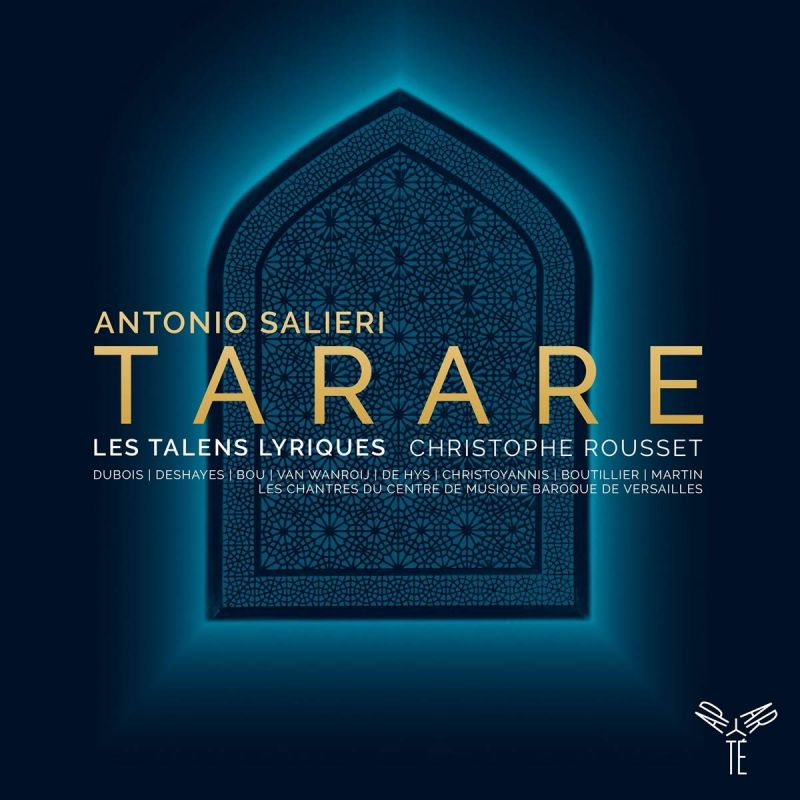SALIERI Tarare (Rousset)
View record and artist detailsRecord and Artist Details
Composer or Director: Antonio Salieri
Genre:
Opera
Label: Aparte
Magazine Review Date: 08/2019
Media Format: CD or Download
Media Runtime: 165
Mastering:
DDD
Catalogue Number: AP208

Tracks:
| Composition | Artist Credit |
|---|---|
| Tarare |
Antonio Salieri, Composer
(Les) Chantres du Centre de Musique Baroque de Versailles (Les) Talens Lyriques Antonio Salieri, Composer Christophe Rousset, Director Cyrille Dubois, Tarare, Tenor Danaé Monnié, Shepherd, Soprano Enguerrand de Hys, Calpigi, Tenor Jean-Sébastien Bou, Atar, Baritone Jérôme Boutillier, Urson, Baritone Judith Van Wanroij, Nature, Soprano Karine Deshayes, Astasie, Mezzo soprano Marine Lafdal-Franc, Elamir, Soprano Philippe-Nicolas Martin, Altamort, Baritone Tassis Christoyannis, Arthenee, Baritone |
Author: Richard Lawrence
At first sight, the libretto – by Beaumarchais, no less – looks like a throwback to the days of Lully and Quinault, with its allegorical prologue (and epilogue) and five-act layout. But the Prologue is not a celebration of the monarch; indeed, the opera ends with the death of Atar, which would have been anathema to the Sun King. And there’s a vein of comedy, which was not a feature of the Lullian tragédie en musique. The story is set in motion by Nature and the Genius of Fire, who choose two shades, as yet unborn: one to be Atar, despot of Asia, the other to be Tarare, a soldier of unknown parentage. They wish to see how these humans turn out: 40 years pass in the twinkling of an eye and the action begins.
Tarare has saved Atar from drowning. In accordance with the principle that no good deed goes unpunished, Atar has Tarare’s wife Astasie abducted: the king cannot bear to see his general happy when he himself is not, and he plans Tarare’s murder. Tarare is helped by the eunuch Calpigi, who, with his wife Spinette, both of them enslaved singers from Italy, provides comic relief. Tarare and Astasie are saved from execution; Atar kills himself and Tarare ascends the throne. Nature and the Genius of Fire conclude that greatness on earth depends not on circumstances but on personal character.
Salieri shows great skill in carrying the drama forwards. Much of the writing is in conversational accompanied recitative. Some of the airs are set pieces; more often, as in Atar’s ‘Qu’une grande solennité’, they lead seamlessly into the next bit of recitative or arioso. But the action is held up by the ‘fête européenne’ arranged for Astasie’s arrival as the new queen. Christophe Rousset makes a cut here, presumably reckoning – rightly, in my view – that three out of the six verses of a number for Spinette and an Uncouth Peasant, with interludes, are plenty – unusual though it is, with its five-bar initial phrase. Gluck is a constant presence – the Janissary jangling of the Overture to Act 1 could be from La rencontre imprévue (Vienna, 1764) – but the Chorus of Shades in the Prologue, ‘Quel charme inconnu’, looks forwards to Die Zauberflöte as well as back to Orfeo ed Euridice.
Cyrille Dubois makes a first-rate Tarare: his ‘Astasie est une Déesse’ is as ardent as his ‘J’irai: Oui, j’oserai!’ is heroic. Calpigi is an interesting character. Fearful of Atar, he is resourceful in helping Tarare; and he finds his musical cojones, so to speak, in the powerful air that concludes Act 4, splendidly delivered by Enguerrand de Hys. Karine Deshayes is a passionate Astasie, especially in ‘Ô mort! Termine mes douleurs’. Another Rousset regular, Jean-Sébastien Bou, fulminates to great effect as the villainous Atar. The other parts are all well taken, including Tassis Christoyannis as Arthenée, the ambivalent high priest, and Judith van Wanroij as a delightfully flirtatious Spinette.
The chorus and orchestra are excellent: some lovely chirruping from the oboes, but it would have been good to hear more from the trombones. Most of the repeats in the dances are cut as are, oddly, three bars of recitative in Act 3. Christophe Rousset conducts with an unerring hand: the sforzandos in the Overture to the Prologue have a Beethovenian force that grips the attention right from the start. Great stuff.
Discover the world's largest classical music catalogue with Presto Music.

Gramophone Digital Club
- Digital Edition
- Digital Archive
- Reviews Database
- Full website access
From £8.75 / month
Subscribe
Gramophone Full Club
- Print Edition
- Digital Edition
- Digital Archive
- Reviews Database
- Full website access
From £11.00 / month
Subscribe
If you are a library, university or other organisation that would be interested in an institutional subscription to Gramophone please click here for further information.





